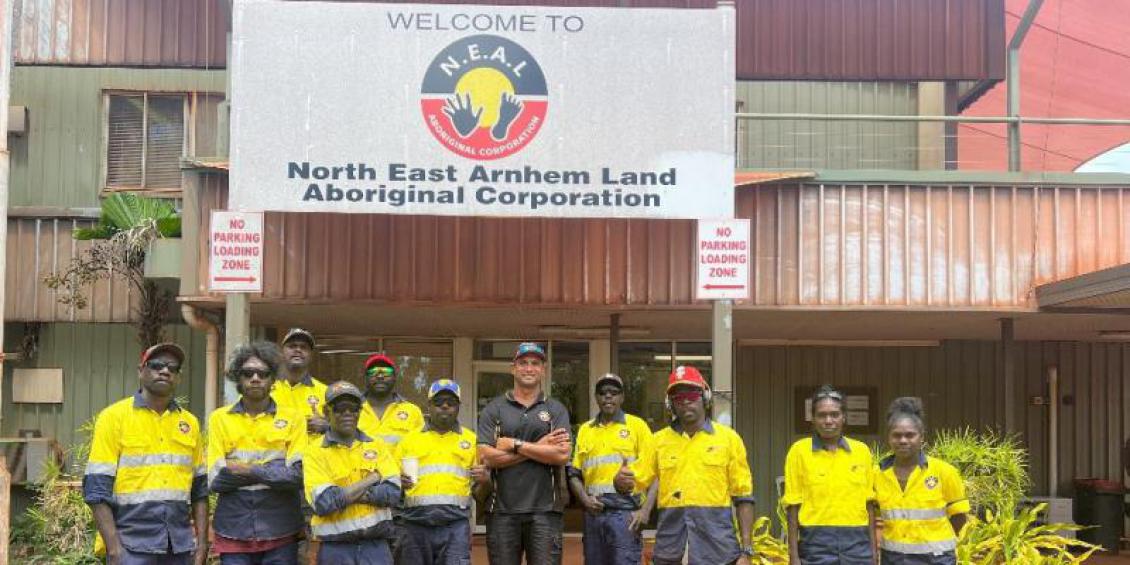Yolngu People take part in the Djama Mirri Mala Program in North East Arnhem Land
Yolngu People take part in the Djama Mirri Mala Program in North East Arnhem Land
National Indigenous Australians Agency

In the remote and stunning landscapes of North East Arnhem Land, a successful employment program has been running since 2017.
The Djama Mirri Mala Program was born from a vision to create opportunities for Yolngu people eager to embark on a journey toward full-time employment.
Damien Djerrkura, a local Traditional Owner from the Wangurri clan group and the Chief Executive Officer of North East Arnhem Land Aboriginal Corporation (NEAL), has witnessed many programs come and go with varying success over the years.
‘A lot of what I’ve seen over the years with training programs that aren’t designed by locals have fallen over,’ shared Damien. ‘I’ve seen enough of what works and doesn’t work, so having that local knowledge really went a long way towards designing this program, so I was confident it would work.’
Through a partnership between the North East Arnhem Land Aboriginal Corporation (NEAL) and The Arnhem Land Progress Aboriginal Corporation (ALPA), this initiative has provided for those seeking a pathway to economic independence.
The Djama Mirri Mala Program doesn't just provide jobs; it aims to prepare participants for the challenges and expectations of mainstream work environments. Through Djama, individuals receive the training and skills needed to thrive in jobs.
‘The program is our recruitment base for local Indigenous job seekers. Through a 4-6 week process, we get them across everything: safety training, licenses, learning tools, maintenance projects around the facility, and our grounds. We get them used to the environment. Any training they need to get them ready to transition into our workforce as employees,’ said Damien.
Participants can transition into full-time employment at their own pace, whether through labour hire placements or paid work placements at NEAL. The program ensures that each participant is given the support they need to succeed.
Once they complete the program, they become NEAL employees and potentially move onto employment elsewhere, opening up other avenues for them. NEAL supports the new employees through this process as well.
One of the program's key innovations is its collaboration with local businesses. These businesses play a pivotal role in the program's success by hiring participants to fill short-term labour shortages or as a trial period before committing to full-time employment.
This collaborative approach helps bridge the gap between the aspirations of Yolngu job seekers and the needs of local enterprises.
'The program has really taken off and in 2023, six local Indigenous people progressed to paid employment.
We identified a gap between CDP-type services and moving into the workforce, which is what the Djama program does,’ Damien noted.
‘Since we’ve run it, we’ve seen numbers absolutely rise in local Indigenous engagement. It’s a very flexible program as well, catering for cultural engagements. People might be out for sorry business for a few weeks, but they can always come back.’
At the heart of this program is flexibility and support.
’There’s a lot of stuff we do outside work hours, going into the community, seeing if there are any issues, and figuring out how we can support them,’ Damien added.
‘We are one of the only organisations in this region with a successful program that facilitates successful transitions to work. It’s something that we are very proud of, something that keeps our community really engaged.’
The Djama Mirri Mala Program is a testament to the power of partnerships, community spirit, and the unyielding determination of the Yolngu people to shape their destiny.






